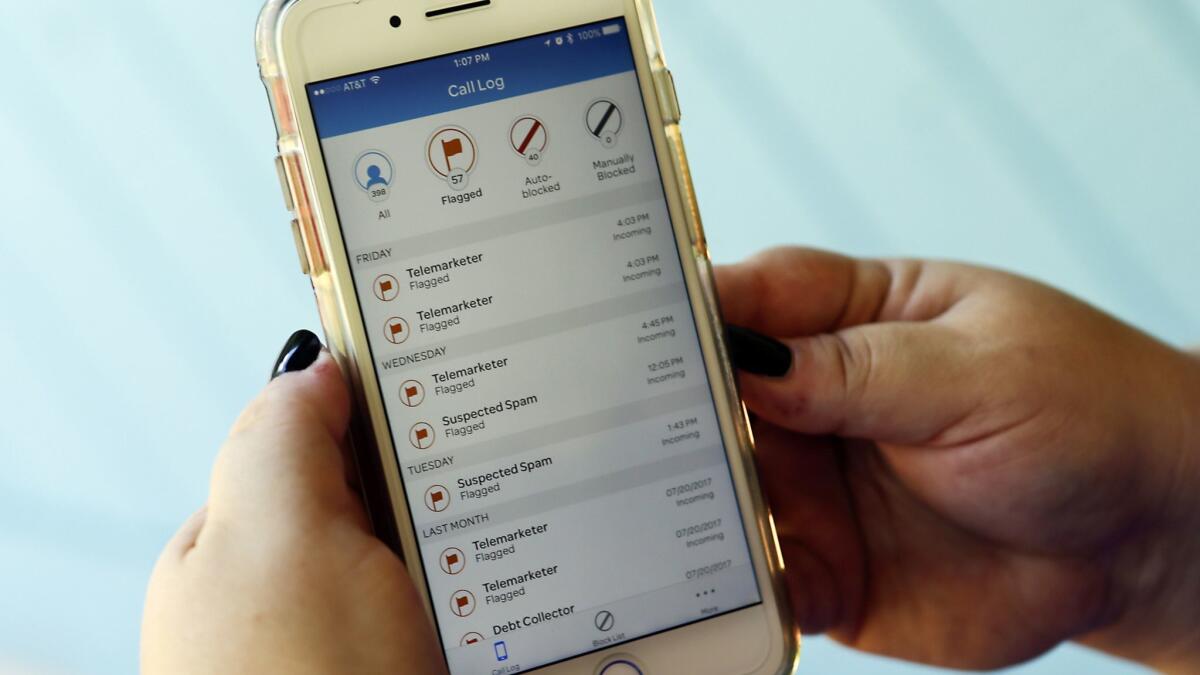FCC gives telephone companies more authority to block robocalls

The Federal Communications Commission voted unanimously Thursday to authorize phone carriers to automatically recognize and block robocalls, a move that could spare Americans from billions of unwanted telemarketing and scam calls each year.
Under the order, which passed 5 to 0, phone companies will be allowed to enroll customers in robocall-blocking programs by default unless consumers opt out. Previously, some companies had tools to fend off unwanted automated calls, but customers had to opt in to gain the benefits.
Advocacy groups generally applauded the move but complained that the FCC order does not require phone companies to utilize robocall-blocking technology, or to provide the service to its customers for free.
“It’s a good step, but we had consistently called for more and hope that they will do more in the future,” said Susan Grant, director of consumer protection and privacy at the Consumer Federation of America, a consumer advocacy group in Washington.
She said she has “some concerns” that not all telecommunications companies will provide the service to their customers.
Robocalls have skyrocketed in recent years. Last year, Americans received 48 billion robocalls, up from 31 billion the year before, according to YouMail, a privately held Irvine company that produces call-blocking software. So far this year, Americans have been bombarded with 25 billion robocalls, including 4.7 billion in May alone, according to YouMail.
“If there is one thing in our country today that unites Republicans and Democrats, liberals and conservatives, socialists and libertarians, vegetarians and carnivores, Ohio State and Michigan fans, it is that they are sick and tired of being bombarded by unwanted robocalls,” FCC Chairman Ajit Pai said at the hearing. “My message to the American people today is simple: We hear you, and we are on your side.”
Pai said he expects phone companies to move quickly to help Americans block unwanted calls.
“Among other things, default call-blocking will reduce the costs of handling the robocalls that flood their networks and save them grief by limiting customer complaints,” he wrote in an op-ed published in USA Today.
Jessica Rosenworcel, a Democrat on the commission who voted for the order, said she thinks it has serious flaws. She called it ‘devastating” that the FCC did not bar phone companies from charging customers fees to block robocalls.
“I am disappointed that for all our efforts to support new blocking technology, we couldn’t muster up the courage to do what consumers want most — stop robocalls and do it for free,” she wrote in a statement.
Experts warn that some nuisance and illegal callers claiming bogus tax bills and phony insurance shakedowns may still bypass the call-blocking technology. Calls from overseas could present a technical challenge. Moreover, the technology could mistakenly fend off calls customers may want to receive.
Not all robocalls are scam calls, said Margot Saunders, a senior attorney at the National Consumer Law Center, a consumer advocacy organization. Pharmacy pickup reminders and school closing notifications are often delivered with automated phone systems, she noted.
“It is unclear how the phone companies will identify and determine whether to permit or block robocalls” in some of these categories, she wrote in a statement, adding that the new order is “not a magic bullet.”
Michael O’Rielly, a Republican member of the commission, expressed similar concerns. In a statement, he said he doubts the technology can always differentiate between legitimate and scam calls.
“The challenge here is finding the right criteria to capture illegal robocalls without also blocking lawful calls, if at all possible,” he wrote.
The commission faced growing pressure to act. In May, the Senate passed the Telephone Robocall Abuse Criminal Enforcement and Deterrence Act, which would outlaw robocalls and mandate that phone carriers implement new robocall-blocking software. The House has not taken up the bill.






